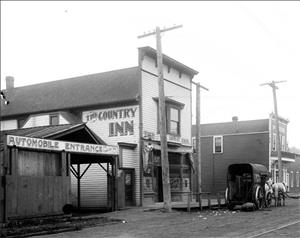On January 8, 1904, the voters of Georgetown decide, 211 to 165, to incorporate under Washington law as a city of the third class. Six years later, voters will decide to be annexed into the city of Seattle. Georgetown, located south of Seattle along the Duwamish River, was in unincorporated King County, and the 2,500 residents managed their own affairs. Businessmen interested in keeping taxes down had defeated earlier efforts at incorporation. The community was home to the Seattle Brewing and Malting Company, the world's sixth largest brewery, and to the car barns of the Seattle-Tacoma Interurban Railway. Georgetown also had seven saloons which operated free of licensing requirements or regulations.
Wetness Threatened by Dryness
The prohibition movement in Washington had sponsored legislation that made the ban on liquor a local option. Rural areas of Eastern Washington tended to be "dry" whereas urban areas like Seattle and Tacoma were usually "wet." The law provided that liquor could not be sold within one mile of an incorporated city. Seattle's annexation of new areas approaching Georgetown threatened to place this center of breweries and prosperous saloons within the dry zone.
Ten days after the election, municipal government was formally established with brewery superintendent John Mueller as the first (and only) mayor. Charles Denney became the marshal, and Harry C. Carson the justice. The Rainier Volunteer Fire Department changed its name to Georgetown Volunteer Fire Department. The new City financed itself by taxing pool halls, saloons, roadhouses, and every game of chance.
The city became a convenient destination for revelers from Seattle, earning Georgetown a reputation for being "wide-open." Saloons operated 24 hours a day and advertised attached lodging arrangements. The opening of The Meadows Racetrack lured more visitors. In 1908, Seattle embarked on a campaign to limit saloon licenses and to disperse its red-light district, which only helped business in Georgetown. But things were beginning to get out of hand, so the city council passed an ordinance in 1909 closing saloons at 1 a.m. It went largely unenforced. Seattle City Councilman Max Wardall called Georgetown, "the cesspool for the vice of Seattle" ("Georgetown Called Cesspool ...").
When King County assessed Georgetown $10,000 as its share of the construction of 1st Avenue S, the city found it difficult to pay. Residents began to consider joining Seattle. The Seattle Times joined the campaign for annexation by running sensational stories playing up the cesspool reputation. On November 9, 1909, a vote for annexation was defeated at the polls. The issue was presented again on March 29, 1910 and it passed. Georgetown had completed its new city hall just six months before. Seattle used the structure as a fire station, a police precinct, and as a public library.

